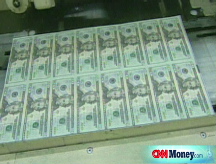How gold got its luster back
Gold prices dipped as low as $712.50 last October but have crept back towards $900 on more fears about the economy and banks. Could it hit $1,000 again?

 |
| Gold prices topped $1000 an ounce last March but have pulled back since then. But some believe gold could hit $1000 again in the next few months. |
NEW YORK (CNNMoney.com) -- How can you tell that this is yet another panic phase of the market? You can look at plunging stock prices. But the recent surge in the price of gold really tells the story.
Gold gained more than 4% Friday to finish at about $896 an ounce. Gold prices have shot up more than 10% in just the past week. If this trend continues, gold should soon climb back above $900 for the first time since October.
This wouldn't be a huge surprise. Most of the financial news this week has been terrible.
Bank stocks are plunging on fears that some of the most troubled, such as Citigroup (C, Fortune 500) or Bank of America (BAC, Fortune 500), might have to be nationalized. Microsoft (MSFT, Fortune 500) announced its first layoffs in its history. And GE (GE, Fortune 500) reported a 44% drop in fourth-quarter net income Friday morning.
Simply put, gold does well when investors think the world is coming to an end. It's a hard asset, which makes it a more stable bet than stocks, corporate bonds and currencies.
"Where do you hide if you want to be defensive? There are fewer and fewer places," said Axel Merk, president of Merk Mutual Funds a Palo Alto, Calif.-based money manager specializing in currency investments.
Just take a look at the gold price chart to the right and you'll see an obvious pattern. A surge in gold prices always corresponded with an increase in investor fear.
Gold hit a record high last March, rising above $1,000 during the height of the Bear Stearns meltdown. But gold retreated to around $900 over the next few months as investor worries subsided...temporarily.
Gold flirted with $1,000 again in July as investors started to worry about the future of Fannie Mae (FNM, Fortune 500) and Freddie Mac (FRE, Fortune 500), and oil prices were hitting record highs.
Gold began to slide again until September, when the collapse of Lehman Brothers and a string of catastrophes drove the metal past $900. And it fell back again, to $712.50, when the bank bailout briefly restored confidence.
And now gold is on fire again. So what's next? Does it break $900 and head back toward $1,000? Or will investor fears diminish once this dreadful fourth-quarter earnings period is over and hopes turn to the possibility of another economic stimulus package?
Last June, I took a lot of flack from readers for suggesting that gold would not pass $1,000 again in the near future. That turned out to be right. But now, some experts are starting to think that a return $1,000 gold is not out of the question.
"Over the next two to three months, gold is very likely to break above the peak," said Carlos Sanchez, associate director with CPM Group, commodities research firm based in New York.
"With financial volatility, economic sluggishness and what's going on politically around the world, most notably in the Middle East, this all creates a formula for prices to head higher," Sanchez added.
Still, what's remarkable about the most recent rise in gold is that is has been accompanied by relative strength in the dollar. Gold often rallies when the dollar is weak...as was the case last summer.
But just because the greenback has rallied from last year's lows, it may not continue to do so, notes Ashraf Laidi, chief market strategist with CMC Markets, a currency and commodities brokerage firm based in London.
"Even though we are seeing some gains in the dollar lately against the euro, traders are all too aware that fundamentals in the U.S. remain weak," Laidi said. "So the dollar remains dysfucntionally high."
In addition, Laidi said that if gold surpasses $900 anytime soon, that could attract more average investors to the currency.
"There is a lot of cash on the sidelines. If gold breaks above $900, it will be in all the headlines and people will chase that and push it higher," he said.
All that said, it's likely that gold will remain as volatile as other investments over the next few months. It won't shoot up in a straight line.
In fact, both Sanchez and Laidi said that -- somewhat paradoxically -- if the economy gets substantially worse over the next few months, investors may take profits in gold and flock to Treasurys as a way to preserve cash.
But Merk points out that longer-term, he's bullish on gold since he thinks that inflation, and not deflation as many fear, will once again become an economic concern.
That's because he expects all the money the government has pumped into the system through rate cuts, bailouts and lending programs will eventually lead to inflation.
"If not for stimulus, we probably would have deflation. But the cure to the disease will make gold go up," Merk said. "At some point, all this money will stick in the economy and it will be impossible to mop up all that liquidity." ![]()



